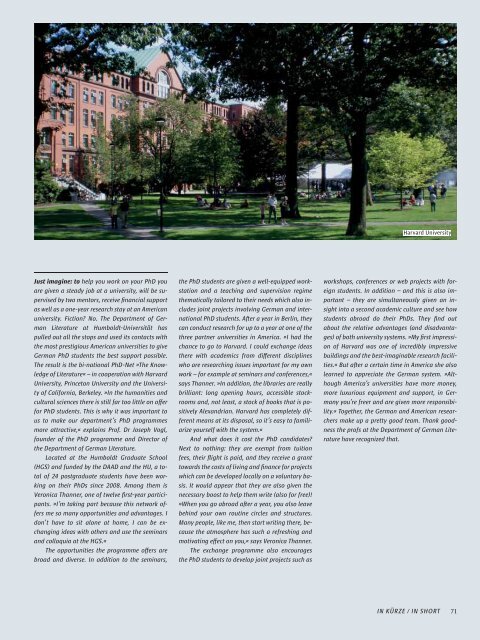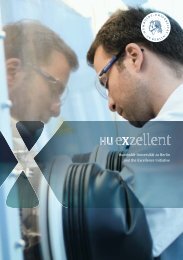hu wissen (pdf) - Exzellenzinitiative - Humboldt-Universität zu Berlin
hu wissen (pdf) - Exzellenzinitiative - Humboldt-Universität zu Berlin
hu wissen (pdf) - Exzellenzinitiative - Humboldt-Universität zu Berlin
Sie wollen auch ein ePaper? Erhöhen Sie die Reichweite Ihrer Titel.
YUMPU macht aus Druck-PDFs automatisch weboptimierte ePaper, die Google liebt.
Just imagine: to help you work on your PhD you<br />
are given a steady job at a university, will be supervised<br />
by two mentors, receive fi nancial support<br />
as well as a one-year research stay at an American<br />
university. Fiction? No. The Department of German<br />
Literature at <strong>Humboldt</strong>-<strong>Universität</strong> has<br />
pulled out all the stops and used its contacts with<br />
the most prestigious American universities to give<br />
German PhD students the best support possible.<br />
The result is the bi-national PhD-Net »The Knowledge<br />
of Literature« – in cooperation with Harvard<br />
University, Princeton University and the University<br />
of California, Berkeley. »In the <strong>hu</strong>manities and<br />
cultural sciences there is still far too little on off er<br />
for PhD students. This is why it was important to<br />
us to make our department’s PhD programmes<br />
more attractive,« explains Prof. Dr Joseph Vogl,<br />
founder of the PhD programme and Director of<br />
the Department of German Literature.<br />
Located at the <strong>Humboldt</strong> Graduate School<br />
(HGS) and funded by the DAAD and the HU, a total<br />
of 24 postgraduate students have been working<br />
on their PhDs since 2008. Among them is<br />
Veronica Thanner, one of twelve fi rst-year participants.<br />
»I’m taking part because this network offers<br />
me so many opportunities and advantages. I<br />
don’t have to sit alone at home, I can be exchanging<br />
ideas with others and use the seminars<br />
and colloquia at the HGS.«<br />
The opportunities the programme off ers are<br />
broad and diverse. In addition to the seminars,<br />
the PhD students are given a well-equipped workstation<br />
and a teaching and supervision regime<br />
thematically tailored to their needs which also includes<br />
joint projects involving German and international<br />
PhD students. A� er a year in <strong>Berlin</strong>, they<br />
can conduct research for up to a year at one of the<br />
three partner universities in America. »I had the<br />
chance to go to Harvard. I could exchange ideas<br />
there with academics from diff erent disciplines<br />
who are researching issues important for my own<br />
work – for example at seminars and conferences,«<br />
says Thanner. »In addition, the libraries are really<br />
brilliant: long opening hours, accessible stockrooms<br />
and, not least, a stock of books that is positively<br />
Alexandrian. Harvard has completely different<br />
means at its disposal, so it’s easy to familiarize<br />
yourself with the system.«<br />
And what does it cost the PhD candidates?<br />
Next to nothing: they are exempt from tuition<br />
fees, their fl ight is paid, and they receive a grant<br />
towards the costs of living and fi nance for projects<br />
which can be developed locally on a voluntary basis.<br />
It would appear that they are also given the<br />
necessary boost to help them write (also for free)!<br />
»When you go abroad a� er a year, you also leave<br />
behind your own routine circles and structures.<br />
Many people, like me, then start writing there, because<br />
the atmosphere has such a refreshing and<br />
motivating eff ect on you,« says Veronica Thanner.<br />
The exchange programme also encourages<br />
the PhD students to develop joint projects such as<br />
Harvard University<br />
workshops, conferences or web projects with foreign<br />
students. In addition – and this is also important<br />
– they are simultaneously given an insight<br />
into a second academic culture and see how<br />
students abroad do their PhDs. They fi nd out<br />
about the relative advantages (and disadvantages)<br />
of both university systems. »My fi rst impression<br />
of Harvard was one of incredibly impressive<br />
buildings and the best-imaginable research facilities.«<br />
But a� er a certain time in America she also<br />
learned to appreciate the German system. »Although<br />
America’s universities have more money,<br />
more luxurious equipment and support, in Germany<br />
you’re freer and are given more responsibility.«<br />
Together, the German and American researchers<br />
make up a pretty good team. Thank goodness<br />
the profs at the Department of German Literature<br />
have recognized that.<br />
IN KÜRZE / IN SHORT<br />
71



